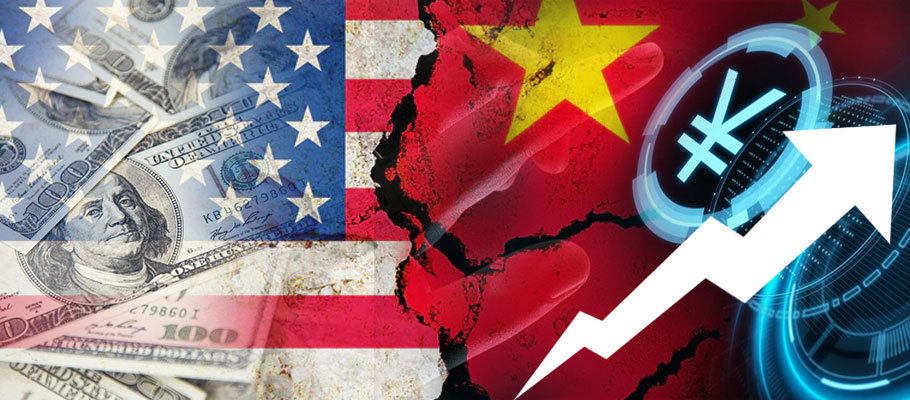
Published: June 5th, 2020
The launch of China’s version of a central bank-backed digital currency has excited speculation in crypto circles as to Beijing’s true intentions. With this dash to the starting line, China gains first-mover status amid several competing national projects. The long-term impact, however, will be to replace fiat currency with a layer of track-able digital cash.
That will give the Chinese government another layer of information to feed into the gaping maw of its massive surveillance regime – as well as providing valuable raw material for the country’s booming AI industry.
If those things happen in tandem with a credible level of decentralisation, the renminbi (RMB) could continue its climb to greater internationalisation, potentially even challenging the greenback’s dominance as the planet’s premier reserve currency.
Xu Yuan, a senior digital finance researcher at Peking University, told journalists this week that ‘when we look back on this year, the two defining events of 2020 may turn out to be the COVID-19 pandemic and the arrival of China’s digital yuan.’
Crypto holders will want to see if that prediction holds true. While institutional and retail investors may see a ‘crypto’ investment opportunity they can finally get behind, a digital RMB will inevitably compete with cryptocurrencies. Both will look to disrupt the existing financial consensus, and other countries may decide to embrace the new model.
Beijing has been working since the late 2000s to speed up internationalisation of RMB.
One of its earliest measures was to issue ‘dim sum bonds,’ debt instruments issued in foreign countries but denominated in Chinese currency. Another policy change has been to formalise currency swap arrangements with a new list of nations. This has led to a more integrated RMB settlement with Hong Kong, Macau and other ASEAN-bloc jurisdictions.
All these moves, however, can be seen as setting the stage for future steps to position the RMB as a leading reserve currency.
Reserve currency is any fiat currency held in significant amounts by global financial infrastructure organisations and central banks outside the country that issued the money. Sterling was the dominant reserve currency throughout the 19th century — recognising Britain’s position as a world leader. The British Empire was the world’s largest trading bloc, and the pound acted as a stabilising influence that helped secure its place.
Today the pound has been supplanted by the dollar, though as the world completes the transition from two superpowers, to one, to a new multipolar reality, other currencies can play a role. Along with greenbacks, central bankers now stock-up their reserve holdings with Euros, Yen, and increasingly – the Chinese yuan.
China wants to see the reserve status of its currency grow, something reflected in IMF inclusion of yuan in its special drawing rights currency basket, to creation of the Asian Infrastructure Investment Bank (AIIB) which is heavily backed by Beijing. The AIIB is widely seen as a potential competitor to both the IMF and the World Bank.
Commentators like ex-US Fed Chief Henry Paulson have said that while politics and the machinations of global financial bodies play their part in deciding which currencies have a reserve role, in the end, its financial fundamentals like demand that will dictate RMB’s prominence in central bank vaults.
Of course, there is truth in that. For any currency to displace USD, markets will have to be convinced of its stability, relative strength against other fiats, and it's potential as an underlying asset.
It’s hard to argue with market fundamentals. Still, experts point to at least two significant reasons why a digital version of RMB would be in a better position to strengthen its reserve currency position – at least in the long term.
Negative perceptions of China’s authoritarian domestic system continue to hurt its international standing. By delegating more control over economic matters to private organisations through a ‘decentralised’ digital currency, Beijing can position digital yuan as something more politically acceptable to national governments (and their central bankers) than RMB in its traditional form, tied to the Chinese state. Other countries may distrust the Chinese government, but they have been much more open to the arrival of Chinese companies, from Alibaba to Huawei (its consumer electronics division, at least).
The adoption of Chinese technology standards and widespread adoption of China-led mobile payment solutions like AliPay and M-Pesa in Africa could strengthen the perceived value of the RMB in those markets.
A number of African central banks are working to improve credibility after years of inflation and currency devaluation. Across the continent, inflation has reached all-time highs relative to the majority of markets they trade with, where low inflation is the norm.
A digital currency that can accomodate different African payment and banking systems, and connect seamlessly with the major Belt and Road Initiative organisations – a driving force in infrastructure development and investment in Africa – could make people question the value of holding US dollar debt when domestic currencies are declining.
China will undoubtedly use its new digital RMB as a weapon in the quest to affirm its economic superpower status. America and its closest allies still dominate the global political and economic order, but they do so by relying on traditional diplomatic levers, currency formats, practices, and institutions.
By using new technologies much the same way digital businesses have done, creating an asymmetric playing field that can wrong-foot market incumbents — Beijing hopes to re-write the rules.
Crypto watchers will want to keep a close eye on coming developments. China’s backing for the digitisation of currency means its set to become a regular part of commercial activity. Whether an ‘independent’ cryptocurrency like Bitcoin or Ethereum wins out could be decided by nation-states grappling for influence, or by private sector peers forging bonds of mutual co-operation.